From the Gender Commissioner in the Horodyshche community of Volyn Region to the Coalition of Organizations in four regions for joint activities to promote human rights, gender equality, empowerment of women and girls in communities.
The team of Gender Creative Space NGO (Lutsk) has so far taken this path. And the advocacy campaign for the appointment of gender commissioners in the communities of Volyn Region began with the six-month Mentoring Program 1.0.
With the support of mentor Olesia Kholopik, director of Centre for Democracy and Rule of Law (Kyiv), the young organization not only developed an advocacy campaign, but also achieved the following results: for the first time a gender commissioner (Horodyshche Community) was appointed in the territorial communities of Volyn Region.
Why is the issue of gender commissioners in communities so pressing?
“Ukraine has a legal framework that regulates the introduction and implementation of gender policy at various levels (national, regional and local),” said Halyna Yerko, Chairperson of the Board, and Halyna Berezhna, Member of the Board of the Gender Creative Space. “Gender Commissioner is a person (coordinator) who deals with ensuring equal rights and opportunities for women and men in the executive and local self-government bodies of the community.”
According to Halyna Yerko and Halyna Berezhna, most gender commissioners in communities (if any) have not received any special training, do not understand the functions and tasks they have to perform, and need methodological and advisory support.
Gender Commissioners, within their powers, channel and coordinate activities in the following areas:
- Participation in the development of gender-sensitive strategies, policies, programs;
- Conducting informational, awareness-raising, training activities to ensure gender equality;
- Cooperation with NGOs and work with the appeals from residents;
- Combating gender-based violence.
It is therefore important that each community have gender commissioners to raise and address these issues. If the position of Gender Commissioner is not introduced, there will be no quality implementation of the gender equality policy in the community, it will continue to exist only on paper and will remain unaddressed by the management and staff of local self-government bodies.
From training to practical advocacy
“In Ukraine, NGOs do not have many opportunities to receive not only money for their own activities, but also support. Therefore, it is important that CSOs could learn new information, learn from best practices and meet colleagues in the sector, because it opens up new opportunities,” stressed Volodymyr Sheihus, Executive Director of Initiative Center to Support Social Action “Ednannia”.
According to him, the mentoring program strengthens both young organizations and civil society in general.
During the 2020 program, each mentee organization developed and began implementing an advocacy plan in collaboration with the mentor.
Also during this period, there were a number of training events for the mentee and two workshops, where experts shared theoretical and practical knowledge about advocacy and the implementation of advocacy campaigns.
“Cooperation with our mentor, Olesia Kholopik from CEDEM, was useful, inspiring and motivating throughout the project period – from the first meeting and discussion of goals and objectives till today,” mentee from Gender Creative Space NGO shares their own experience.
The goals of their advocacy campaign, in particular, were to identify the person who will perform the duties of the gender commissioner and provide them with the necessary recommendations for the performance of official duties; inform the head and management of the TC about the importance of having a gender commissioner in the community and receive his/her support; carry out awareness raising work among different groups of residents of the community (councillors, executive committee, vulnerable categories, public sector, etc.).
With the support of the mentor, the mentee organization:
- Received a response to a request from the Volyn Regional State Administration regarding persons who are in charge of gender equality in the communities of the region;
- Built rapport with the head and management of Horodyshche TC of Volyn Region;
- Identified ways to implement the institution of gender commissioner in the TC;
- Received the consent of the TC head to introduce the position of gender commissioner.
Mentoring program is just the beginning
Gender Creative Space joined the program “Superpower for Women’s Human Rights Organizations” (PACT Ukraine), became a member of the Western Hub, which oversees the NGO Women’s Perspectives Center.
With the support of Pact Ukraine, the organization implemented the project “Building a gender-sensitive educational environment in the communities of Volyn Region”, as part of which it developed and disseminated in the communities of Volyn Region a Roadmap for gender mainstreaming in the educational process in the context of the Biarritz Partnership.
Currently, Gender Creative Space NGO is a sub-grantee of the International Research & Exchanges Board (IREX) within the project “Study and distinguish: info-media literacy – national deployment”.
The organization also formed a coalition of 5 local women’s organizations, which included NGOs from Volyn, Ivano-Frankivsk, Lviv and Chernivtsi Regions.
The Coalition’s joint work will focus on supporting respect for human rights, advocating for gender equality and empowering women and girls in the communities of these regions.
To participate in the Mentoring Program 3.0 as a mentee, we invite regional organizations to fill out the form at the below link by December 23, 2021 (inclusive): https://bit.ly/3C7mp4C.
Mentoring Program 1.0 was implemented as part of the Project Ukraine Civil Society Sectoral Support Activity implemented by the Initiative Center to Support Social Action “Ednannia” in partnership with the Ukrainian Center for Independent Political Research (UCIPR) and Centre for Democracy and Rule of Law (CEDEM) with the sincere support of the American people through United States Agency for International Development.



